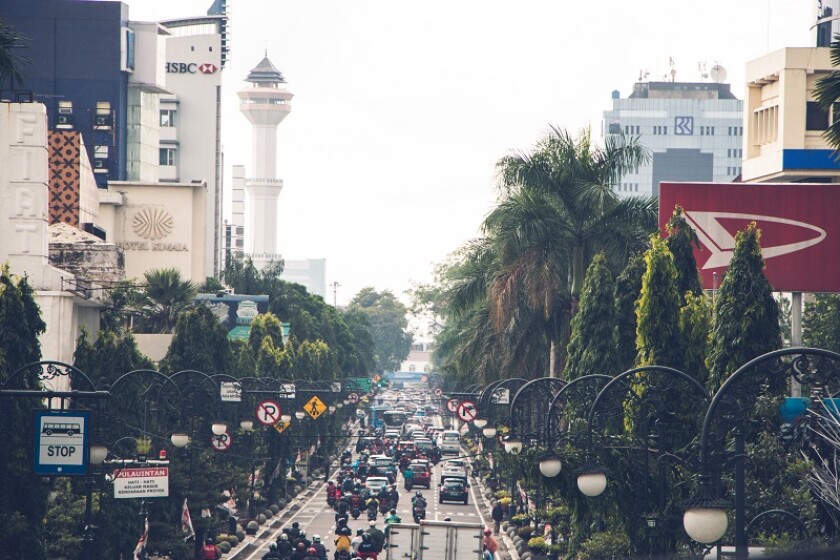SECTION 1: Market outlook
1.1 How would you summarise your jurisdiction's attitude towards the influence of Japanese corporate culture in its industries?
Over the past few years, the economic partnership between Indonesia and Japan has strengthened and grown rapidly. Japan has historically been a key strategic partner to Indonesia, and is currently its largest trading partner. Indonesia is also a major supplier of natural resources to Japan, especially liquefied natural gas for which it is its biggest supplier. Japan has more investments in Indonesia than any other Southeast Asian country, and according to data from Indonesia's Investment Coordinating Board (BKPM), foreign direct investment from Japan to Indonesia has increased considerably, totaling $14.9 billion, and with an average growth rate of 30% in the five year period to 2015.
1.2 What is the outlook for Japanese investment into your jurisdiction over the next 12 months?
Estimated infrastructure investment up to 2019 is projected to be up to $460 billion, with 30% of this total coming from the private sector. The transportation and power sectors are the two areas where the Japanese have invested most heavily. They have also made significant investments in the industrial sector, including, among others, automotive products, electronic goods, mineral processing, power plants, coal gasification, petrochemicals and glass.
In 2015, the President set an ambitious goal of developing 35,000 MW of power capacity over the next five years to resolve Indonesia's endemic electric power shortages and to propel economic growth. Japanese investors have and are expected to continue to play a significant role in this development. One example is PT Bhumi Jati Power, established by Sumitomo Corporation as lead developer, building a 2x1000 MW coal fired power plant in Central Java with a total investment of $4 billion. Other notable projects include Itochu and J-Power's 2x1000 MW power plant development in Batang, with a total investment of $4 billion, and Marubeni's 1000 MW power plant expansion near Cirebon, with a total investment of $2 billion. Japanese Prime Minister Shinzo Abe's visit to Indonesia revealed many other potential areas for collaboration, from railway projects, port development financing, irrigation facility construction and deep sea ports for gas fields, among others.
To underline its commitment to infrastructure development, the Indonesian government has not only reallocated over $20 billion in fuel subsidies towards infrastructure but has also improved and simplified requirements for foreign investment, including by increasing the allowed foreign ownership percentage in several sectors and the convenience of the one stop service provided by BKPM, thereby accelerating the licensing process.
SECTION 2: Approving foreign investments
2.1 Explain the foreign investment approval process and approval timetable.
Most private foreign investment has been through the establishment of foreign investment companies, also referred to as PMA companies under the auspices of the BKPM, with the exception of the banking, finance and insurance sectors, which are governed by a separate regulatory regime under the auspices of the Financial Services Authority (OJK).
The process of establishing a new PMA company, from submitting the application with BKPM to completion, can take three to six months, and consists primarily of the following steps:
1) Reservation of name
2) Obtaining an access code for BKPM online filing purposes and online submission of the investment application to BKPM
3) Issuance of a BKPM In-principle License
4) Execution in the presence of a local notary of the deed of establishment containing the articles of association
5) Obtaining general corporate licences, such as a letter of domicile, applying for a tax registration number, establishment of a bank account and payment of capital
6) Obtaining approval of the Ministry of Law and Human Rights (at this point full limited liability status is obtained)
7) Registration of the articles of association with the relevant office of the Ministry of Trade and fulfilment of other administrative formalities, including publication of the articles of association in the official State Gazette
8) Upon commencement of commercial production/operation, application for a business licence (IU) to the BKPM that is valid as long as the PMA company conducts its business
For major investment projects, BKPM offers an expedited investment approval process with a Three-Hour Investment License. This service is open to investors with a project with one of the following characteristics:
1) An investment plan of at least Rp100 billion ($7.5 million)
2) Employs 1,000 or more personnel
3) Engages in certain manufacturing activities
4) Located in certain areas that enjoy an inland free trade arrangement
5) Engaged in certain manufacturing businesses that are part of a supply chain,
6) Located in a special economy zone; and/or
7) are an infrastructure project in certain sectors.
2.2 Are there any investment restrictions in specially regulated sectors and is the government entitled to any special rights in these sectors?
The business areas in which PMA companies are allowed to operate are restricted by the so-called Negative List. The Negative List sets out those areas in which investment by both Indonesians and foreigners is restricted or entirely prohibited.
In addition to the Negative List, the laws and regulations governing the conduct of certain lines of business determine whether the business area is open to foreign investment and, if so, whether a PMA company engaging in that business area can be wholly foreign owned or only partially foreign owned or is subject to other restrictions or requirements.
In practice, even if a particular line of business is not listed in the Negative List, investors should confirm with the BKPM and the relevant technical ministry (if applicable) as to the conditions and requirements for foreign investment.
2.3 Which authority oversees competition clearance? Please give a brief overview of the merger clearance process.
In Indonesia, competition clearances are supervised by the Business Competition Supervisory Commission (KPPU). Transactions resulting in a combined asset value of more than Rp2.5 trillion ($187 million) or a combined sales value of more than Rp5 trillion must be reported to the KPPU. If certain thresholds are met, transactions must be reported to the KPPU after the transaction occurs.
Indonesia now acknowledges pre-transaction consultations, although a written evaluation by the KPPU resulting from such consultation does not serve as an approval for, or a rejection of the proposed acquisition and does not eliminate the KPPU's right to conduct an evaluation after the acquisition has been carried out. The written evaluation is an opinion on whether there is any indication that monopolistic practices or unfair business competition may result from the acquisition. The acquirer is not bound by the evaluation and may proceed to implement their plan regardless of the outcome of the evaluation.
If informing the KPPU of a reportable transaction is not undertaken within the 30 working day time limit, the KPPU can impose a fine of up to Rp1 billion ($75,187) for each day of delay, up to a total of Rp25 billion. Further, if the parties fail to submit a notification at all, the KPPU may impose the maximum fine (Rp25 billion).
2.4 Are there further approval requirements that foreign investors should be aware of?
Manpower related licences
A Foreign Manpower Utilization Plan (RPTKA) listing the proposed foreign employees of the PMA company will be required before the PMA company can employ foreign employees. In addition to the RPTKA, a PMA company must also apply for Expatriate Work Permits for its respective foreign employees. The RPTKA and Work Permits are applied for at the BKPM.
Land related licences
The Location Permit is a permit granted to a company to obtain land required for investment. It also serves as a permit to transfer rights, and to utilise the land for business investment purposes. The Location Permit will be necessary if the project requires a land bank, such as for infrastructure or manufacturing. The Location Permit will need to be obtained before conducting any land acquisition. Construction licences will also be important for any building operations.
Environmental licences
Businesses or activities that may have a significant impact on the environment (for instance if there is a fundamental change to the environment caused by such business or activity as required under prevailing laws and regulations) require an Environmental Impact Analysis (AMDAL). If a business or activity does not require an AMDAL but has an impact on the environment, the company must prepare a report on its Environmental Management Efforts (UKL) and Environmental Monitoring Efforts (UPL). Companies conducting activities which do not require an AMDAL or UKL-UPL must provide a written statement that they will manage and monitor the environment.
An Environmental Permit is required for any activity which requires an AMDAL or UKL-UPL. Without an Environmental Permit, an operating licence for the relevant business activity will not be issued.
Other approvals
With the increase in regional autonomy, investments located in Indonesia's provinces will often need regional approvals or licences. In addition, certain technical ministries may also have specific permits and approvals which a PMA company will need before commencing operations. Care should be taken to ensure that all national and local government policies, practices and procedures are complied with as these may also affect the operations of a PMA company. The Master List approval requirement to be able to enjoy certain tax breaks is mentioned in Section 6.3 below.
As well as approval requirements, investors need to be aware of the many potential reporting requirements that accompany the establishment of a PMA company.
SECTION 3: Investment techniques
3.1 What are the most common legal entities used for Japanese investment in your jurisdiction?
Foreign investment in Indonesia must generally be in the form of a PMA company. Establishing a branch of a foreign company is not permitted (except for banks) and representative offices are generally only permitted to undertake marketing and promotional activities.
A PMA company is an Indonesian limited liability company and, subject to any specific restrictions, may be a joint-venture company established by a foreign investor and an Indonesian (corporate or individual) partner or (if 100% foreign shareholding is permitted) by foreign individuals and/or wholly foreign-owned corporate entities. The principal ways of structuring a foreign investment in Indonesia is either by establishing a new PMA company or acquiring shares of (and then converting to PMA company status if Indonesian-owned) an existing company.
As indicated, the BKPM acts as the prime regulator of foreign investment in Indonesia and some technical ministries have transferred certain functions to BKPM so that BKPM is becoming more of a one-stop-shop for foreign investors seeking to invest in Indonesia.
3.2 What are the key requirements for establishment and operation of these legal entities?
Minimum capital requirement
The issued and paid-up capital of a PMA company must be at least Rp2.5 billion with the participation from each shareholder being not less than Rp10 million. BKPM may require a higher capital investment on a case-by-case basis (for example for capital intensive businesses like power plants, toll roads, etc.).
Minimum capital investment value
The total capital investment value of a PMA company must be more than Rp10 billion, consisting of equity (share) capital and loans but excluding land and building, for each line of business.
Maximum foreign shareholding percentage
Please see Section 2.2 above.
SECTION 4: Dispute resolution
4.1. How effective are local courts' enforcement and dispute resolution proceedings, and what should Japanese investors be particularly aware of?
Litigating commercial disputes under Indonesia's judicial system is invariably expensive, lengthy and generally unpredictable. In Indonesia, judges are not bound by precedent and have discretion to decide matters on grounds of fairness and reasonableness. Each case before the Indonesian courts is determined on the basis of its particular facts and merits. In principle, Indonesian general courts, for example district courts and high courts, hear civil lawsuits and criminal claims. Nearly all decisions may be appealed to higher courts and recovery of legal costs is generally not possible. Certain courts of specialised jurisdiction address specific areas of law, for example a commercial court specifically for bankruptcy and intellectual property cases. Given the above, the resolution of a commercial dispute is usually sought in (often international) arbitration or alternative dispute resolution (such as mediation), particularly by foreign companies doing business in Indonesia.
The enforcement of foreign arbitration awards is also recognised in Indonesia. Please see Section 4.3 below for more details.
4.2. Does your jurisdiction have a bilateral investment protection treaty with Japan and is that commonly used by investors?
Indonesia does not have any BIT with Japan.
4.3. Do local courts respect foreign judgments and are international arbitration awards enforceable?
Indonesia is not party to any treaty concerning reciprocal enforcement of court judgments. In principle, foreign court judgments are not enforceable in Indonesia; new proceedings are required and the aggrieved party must file a new suit in the relevant district court in Indonesia. The foreign court judgment may be introduced as evidence in the new proceeding, but the Indonesian court will not be bound by the findings of the foreign court.
The Indonesian Arbitration and Alternative Dispute Resolution Law recognises the enforcement of foreign arbitral awards in Indonesia as Indonesia is a signatory to the New York Convention of 1958 on the Recognition and Enforcement of Foreign Arbitral Awards. A foreign arbitral award must be registered with the Central Jakarta District Court which will issue a writ of execution (exequatur) for its enforcement.
SECTION 5: Forex controls and local operations
5.1 What foreign currency or exchange restrictions should foreign investors be aware of?
In general, there are no particular foreign currency or exchange restrictions that might raise potential red flags in Indonesian investment activities. The Indonesian rupiah is freely convertible into any currency and vice versa. However, if the foreign currency transfer exceeds $100,000 or its equivalent, the parties must submit and provide underlying documents to the relevant Indonesian bank which processes the transfer.
There is also a mandatory use of rupiah requirement for transactions conducted within Indonesia. Rupiah must be used in all payments and/or financial transactions in Indonesia, except for certain transactions, among others International trade transactions and financing.
SECTION 6: Tax implications
6.1 Are there tax structures and/or favourable intermediary tax jurisdictions that are particularly useful for Japanese investors into the country?
Japanese investors can utilise the tax treaty between Indonesia and Japan to reduce tax rates and double taxation. Specifically for transfers of shares between an Indonesian and a foreign company domiciled in a tax-heaven jurisdiction, 25% of the transaction value will be deemed as taxable gain if such foreign company acts merely as a special purpose vehicle. However, this tax imposition does not apply if there is an exclusive right of taxation provided by applicable tax treaty. Of course, other intermediary jurisdictions can be used by Japanese investors for tax purposes. Indonesia has recently introduced additional restrictions on transfer pricing.
6.2 What are the applicable rates of corporate tax and withholding tax on dividends?
The general corporate tax rate is 25%. The withholding tax on dividends for resident corporate taxpayers is 15%. No tax is withheld for dividends paid out of the reserve fund or if the corporate equity participation (paid-up capital) in the dividend paying entity is at least 25%. The withholding tax on dividends for non-resident taxpayers is 20%, subject to reduction under any applicable tax treaty.
6.3 Does the government have any tax incentive schemes in place?
Yes, a PMA Company which requires offshore capital goods will usually submit a Master List of capital goods to BKPM for approval for its imports of machinery, equipment, and spare parts to obtain import duty and other facilities if certain requirements are fulfilled. In addition, tax allowances or tax holidays for certain types of business activities and/or businesses in certain (particularly remote) regions. As a general idea, a tax allowance or tax holiday may be granted to industries which require a substantial investment, such as infrastructure or pioneer industries (such as telecommunications, crude oil refiners, and industrial machinery manufacturers).
A recent tax amnesty programme provided an opportunity for all taxpayers to report undisclosed assets and pay a certain amount of compensation in return to the government until March 31 2017. All the undisclosed assets being reported in the tax amnesty program will not be assessed further.
6.4 Are there any reciprocal tax arrangements between your jurisdiction and Japan? If so, how can they aid investors?
Yes, there is a double tax treaty between Indonesia and Japan which provides better tax rates for some taxable objects. For investors, one of the benefits is double income tax avoidance.
About the author |
||

|
|
Vincent Ariesta Lie Partner, Makarim & Taira S Jakarta, Indonesia T: 6221 252 1272 F: 6221 252 2750 Vincent Lie is a partner at Makarim & Taira S who combines broad legal experience with a keen sense for clients' business context. Lie is able to counsel clients on their commercial objectives through Indonesia's regulatory landscape. Besides handling traditional corporate practice areas, he is also familiar with fast-evolving growth sectors in Indonesia such as energy and in the digital space. He has represented prominent companies in a variety of proceedings and transactions such as, but not limited to, corporate and commercial matters including acquisitions and project financing, bankruptcy, dispute resolution, arbitration including enforcement of foreign arbitral awards, natural resources and energy (mining, oil and gas, power plants) and information technology/startups. Lie has spoken at various seminars and conferences on power plants, mining, energy resources and bankruptcy arranged by In-House Congress, the Asian Law Students' Association, Padjajaran University and Pelita Harapan University. |
About the author |
||

|
|
Yohanes Masengi Partner, Makarim & Taira S Jakarta, Indonesia T: 6221 252 1272 F: 6221 252 2750 Yohanes Masengi is a partner in the corporate and commercial group with extensive experience in investment, infrastructure, power projects, ports, mergers and acquisitions, joint-ventures, employment and corporate restructuring. He has represented prominent companies in a variety of proceedings and transactions, including land acquisition, project financing, and natural resources and energy. These include representing independent power producers in the development of various large-scale power projects in Indonesia; representing the employer in the settlement of labour disputes and mass terminations due to redundancy and closure involving more than 300 employees on one occasion; representing a state owned enterprise related to arbitration in the Badan Arbitrase Nasional Indonesia (BANI) in a dispute over a construction insurance claim with one of the local insurance companies; providing legal assistance in the renegotiation of concessions and contracts with state owned enterprises; providing legal assistance in the acquisition of land with an area of approximately 85 hectares for infrastructure projects; providing legal assistance in various joint-ventures and the establishment of companies in Indonesia; and advising on various matters related to concessions and business activities. |
Click image below to download the Japanese version of this article

